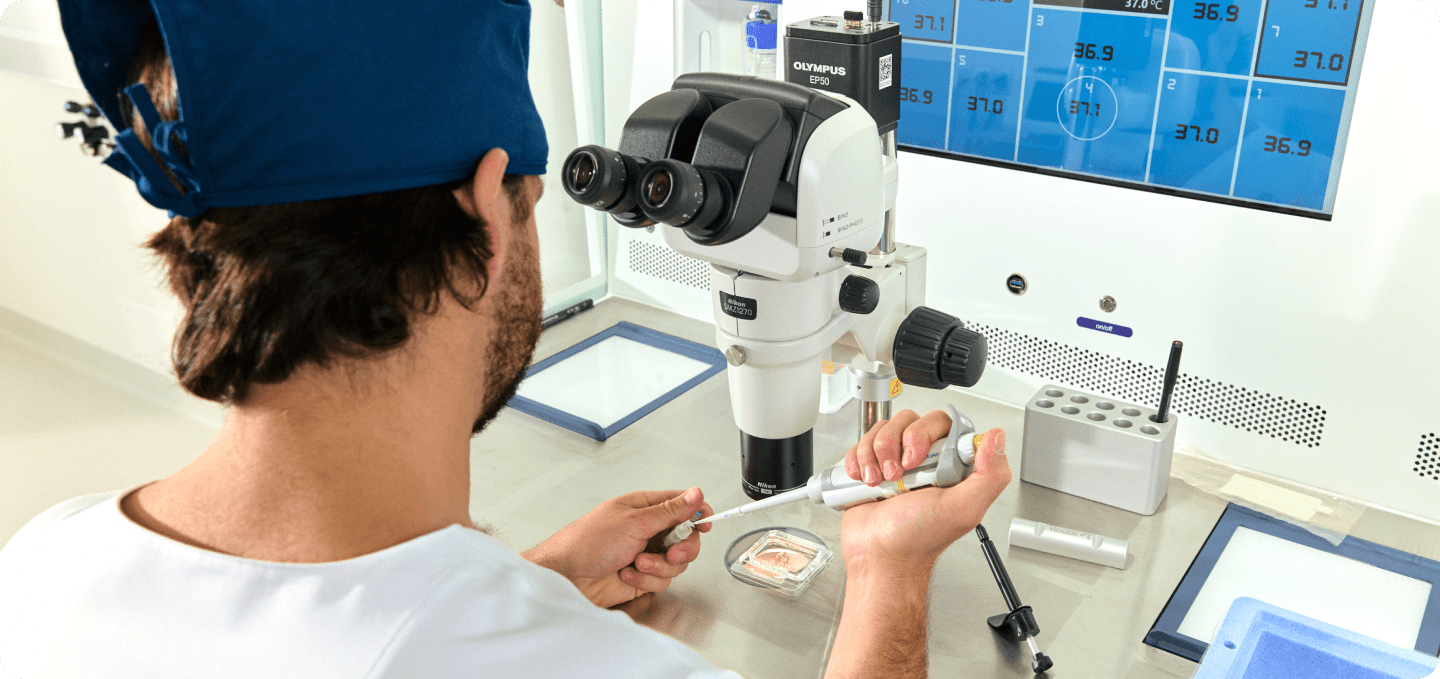Genetic testing can help with recurrent miscarriages and hereditary diseases. Discover how it works and how it can guide your family planning.
Key Facts About Genetic Testing and Infertility
- Genetic factors, such as chromosomal abnormalities, gene mutations, or hereditary diseases, can contribute to infertility.
- Recurrent miscarriages are often linked to genetic causes.
- Carrier screening helps identify whether a person carries a recessive gene mutation that could be passed on to their child.
- Preimplantation genetic testing (PGT) can detect embryos with genetic abnormalities during IVF, improving the chances of a healthy pregnancy.
- In most cases, health insurance does not cover the costs of genetic testing.
Particularly relevant for recurrent miscarriages and hereditary diseases
Infertility can have various genetic causes. Modern genetic tests provide couples with the opportunity to identify hereditary factors such as chromosomal abnormalities, gene mutations, or inherited diseases at an early stage.
In this article, you'll learn which genetic tests may be useful, how genetic counseling works, and the role genetic diagnostics play in fertility treatment.
When Is Genetic Testing Helpful for Conception?
Genetic testing is an integral part of modern reproductive medicine, providing valuable insights into the causes of infertility and guiding personalised treatment strategies.
While not all infertility cases have a genetic basis, genetic testing can be incredibly valuable in a significant number of situations:
- Recurrent miscarriages (spontaneous abortions)
- A family history of genetic disorders
- Unexplained infertility with no identifiable cause
- Azoospermia (absence of sperm in the ejaculate)
- Abnormal findings in a semen analysis (spermiogram)
- Planned IVF or ICSI treatment

Genetic Causes of Infertility
Chromosomal Changes and Disorders
Certain chromosomal alterations can impact fertility. These include chromosome rearrangements such as balanced translocations, inversions (where a segment of the chromosome is reversed), and numerical abnormalities. Studies show that around 3–5% of couples with infertility have a chromosomal abnormality. Among men, approximately 7% of the general population are infertile, with genetic disorders being the cause in at least 15% of cases.
Certain chromosomal alterations can impact fertility, including:
- Balanced translocations – Structural rearrangements of chromosomes that can lead to miscarriage or infertility.
- Chromosomal abnormalities – Variations in chromosome number or structure that affect reproductive health. These abnormalities, including aneuploidy (an abnormal number of chromosomes), can lead to various issues.
- Microdeletions – Small genetic losses that disrupt essential genes.
These variations can range from large-scale chromosome rearrangements to subtle changes within a single gene within the vast landscape of the human genome.
Y Chromosome Microdeletions – Effects on Male Fertility
After Klinefelter syndrome, Y chromosome microdeletions are the second most common genetic cause of male infertility. These deletions affect specific regions on the long arm of the Y chromosome, known as AZF (azoospermia factor) regions, which are crucial for sperm production. Microdeletions in these regions are a common cause of azoospermia (absence of sperm in the ejaculate).
X and Autosomal Chromosome Abnormalities in Infertility
Not only Y chromosome abnormalities but also changes in the X chromosome and autosomes can impact fertility:
- Turner Syndrome (45,X) in Women – A condition where a woman has only one X chromosome instead of two. This often leads to underdeveloped or absent ovarian function, resulting in infertility.
- Klinefelter Syndrome (47,XXY) in Men – A genetic disorder where men have an extra X chromosome, which can impair testosterone production and significantly reduce sperm count.

Genetic Diseases and Mutations Affecting Fertility
Certain genetic conditions, such as cystic fibrosis (CFTR gene mutation) and fragile X syndrome (FMR1 mutation), can contribute to infertility. While fragile X syndrome can affect both men and women, leading to cognitive impairments or premature ovarian failure in women, cystic fibrosis can impact fertility due to structural and functional changes in the reproductive system.
Cystic Fibrosis and Infertility
Cystic fibrosis (CF) is an inherited disorder that causes thick, sticky mucus to accumulate in various organs, including the lungs and digestive system. It follows an autosomal recessive inheritance pattern and is caused by mutations in the CFTR gene. In addition to respiratory and digestive complications, cystic fibrosis can significantly impact fertility:
- Men: The vast majority of men with CF have congenital bilateral absence of the vas deferens (CBAVD), meaning sperm cannot be transported, leading to azoospermia. Sperm production may also be impaired.
- Women: In female CF patients, thick cervical mucus can hinder sperm from reaching the uterus, and changes in the endometrial lining may make implantation more difficult.
While advancements in treatment have greatly improved life expectancy and quality of life for people with cystic fibrosis, fertility challenges remain. If CF is suspected, genetic counseling and CFTR gene testing are recommended for couples trying to conceive.
Fragile X Syndrome and Reproductive Health
Fragile X syndrome is the most common monogenic cause of intellectual disability and can also affect fertility. It results from mutations in the FMR1 gene and can manifest differently in men and women:
- Men: A premutation in the FMR1 gene can lead to Fragile X-associated tremor/ataxia syndrome (FXTAS), a neurological condition affecting movement and coordination. This genetic alteration may also impact sperm quality.
- Women: Women with an FMR1 premutation are at risk of primary ovarian insufficiency (POI), leading to an early decline in egg quantity and quality, which can result in infertility.
For couples struggling with infertility, genetic counseling and FMR1 testing can help assess the risk of fragile X syndrome and guide reproductive decisions.
Genetic Screening Methods for Infertility
Modern genetic tests can identify a range of genetic disorders that impact fertility. These tests help detect chromosomal abnormalities, gene mutations, and hereditary conditions that may contribute to infertility or recurrent miscarriages.
Chromosome Analysis (Karyotyping)
A chromosome analysis is performed using a blood sample to examine structural or numerical chromosome abnormalities. This test can detect:
- Translocations – When sections of one chromosome are transferred to another. A balanced translocation may not cause health problems but can lead to miscarriages or infertility.
- Numerical abnormalities – Such as trisomies, where an extra chromosome is present, potentially leading to pregnancy complications.
Preimplantation Genetic Testing (PGT)
Preimplantation Genetic Testing (PGT) is performed as part of an IVF cycle or intracytoplasmic sperm injection (ICSI) to screen embryos for genetic defects before implantation. This method offers several advantages:
- Reduces the risk of miscarriage – Many miscarriages result from chromosomal abnormalities. PGT helps identify affected embryos before transfer.
- Increases IVF success rates – By selecting embryos with the highest chance of implantation, PGT can improve pregnancy outcomes.
- Helps couples with recurrent miscarriages – PGT is particularly beneficial for couples who have experienced multiple pregnancy losses due to genetic factors.
Learn more about PGT in this podcast episode with an embryologist:
Prenatal Diagnostics
The results of genetic counseling and diagnostic tests—such as chromosome analysis or carrier screening—can help determine whether prenatal testing is advisable. These tests enable early detection of potential health risks and support informed decisions about pregnancy care.
CFTR Gene Analysis
Mutations in the CFTR gene, responsible for cystic fibrosis, can impact both egg quality and sperm production, potentially affecting fertility and pregnancy outcomes.
Carrier Screening
Carrier screening analyses DNA to identify whether an individual carries a mutation in a single gene that could cause a recessive genetic disorder in their offspring. Since recessive diseases only manifest when both parents pass on an altered gene, carriers themselves are typically healthy but can still transmit the condition.
Common diseases screened in carrier testing include:
- Cystic fibrosis
- Spinal muscular atrophy (SMA)
- Sickle cell anemia
Carrier screening helps couples assess their individual risk and make informed reproductive choices.
Thrombophilia Screening
Thrombophilia is a genetic predisposition to increased blood clotting, which can lead to complications during pregnancy. Blood clots in the placenta can disrupt fetal blood supply, increasing the risk of miscarriages.
Thrombophilia screening is particularly relevant for women with recurrent pregnancy loss. Key genetic factors examined include:
- Factor V Leiden mutation
- Prothrombin mutation
HLA Typing
The HLA (Human Leukocyte Antigen) genes play a crucial role in immune defense. In rare cases, genetic mismatches between partners can trigger an immune response against the embryo, leading to implantation failure or recurrent miscarriages.
HLA typing can help identify immunological causes of infertility by detecting:
- Maternal antibodies against the embryo
- Overactivity of natural killer (NK) cells, which may prevent implantation
Additionally, HLA typing can be used in preimplantation genetic testing (PGT) to select embryos that are HLA-compatible with an existing sick child. This allows for the collection of umbilical cord stem cells after birth, which can be used for a life-saving stem cell transplant in the affected sibling.
How Does Genetic Counseling for Infertility Work?
Genetic Counseling: Understanding Risks and Options
Genetic counseling empowers couples with essential genetic information to understand their risk factors and make informed decisions about family planning.
Genetic counseling provides couples struggling with infertility with a thorough assessment of their genetic risks and available testing options. During the consultation, a geneticist evaluates the couple's personal and family medical history, focusing on:
- Previous illnesses and existing medical conditions
- Recurrent miscarriages
- Family history of hereditary diseases
- Any other relevant genetic factors
Based on this information, the couple receives a personalised risk assessment for genetic disorders or infertility-related conditions. They are also informed about possible genetic tests that could provide further insights. Before any testing is performed, written consent is required.
Genetic Testing: What to Expect
Genetic tests are typically conducted using a blood sample, from which DNA is isolated and analysed. Common tests include:
- Karyotyping (Chromosome Analysis) – Identifies structural or numerical chromosome abnormalities
- Y-Chromosome Microdeletion Analysis – Detects genetic causes of male infertility
- Carrier Screening – Determines whether one or both partners carry a recessive genetic mutation
- HLA Typing – Examines immune-related genetic factors that may affect fertility
Depending on the couple’s individual situation, additional tests may be recommended, such as hormone analysis or a semen analysis.
Discussion of Results: Next Steps
Once the test results are available—usually within several weeks—the geneticist explains their meaning and implications in detail. Together with the couple, they discuss potential next steps, which may include:
- Fertility treatments such as IVF or ICSI
- Preimplantation Genetic Testing (PGT) to select genetically healthy embryos
- Sperm or egg donation in cases of severe genetic risk
- Further genetic counseling or additional diagnostic procedures
If mosaicism is detected in an embryo, the geneticist will discuss the potential implications and help the couple make informed decisions about whether to transfer the embryo.
Genetic counseling for infertility is a complex but valuable process that involves close cooperation between the couple, the geneticist, and the fertility specialist.

FAQ About Genetic Testing For Infertility
When is genetic testing recommended for couples trying to conceive?
Genetic testing is advisable if:
- There is a family history of genetic diseases
- Repeated miscarriages have occurred
- Infertility has no clear cause
- Assisted reproduction (IVF or ICSI) is planned
- A genetic disorder is suspected
A consultation with a genetic counselor can provide valuable insights and help determine whether specific genetic tests are beneficial.
How does genetic testing support fertility treatments (IVF/ICSI)?
Genetic tests such as chromosome analysis and preimplantation genetic testing (PGT) help identify potential genetic causes of infertility or recurrent pregnancy loss. PGT-A can improve IVF success rates by identifying embryos with the correct number of chromosomes, increasing the chances of implantation and a healthy pregnancy. This is particularly beneficial for couples with advanced maternal age or a history of recurrent miscarriage.
What does genetic testing for fertility cost?
The cost of genetic testing varies based on the type of analysis required:
- Genetic counseling is usually covered by basic health insurance as a standard medical consultation.
- Karyotyping (chromosome analysis): CHF 500 – 1,000.
- Expanded genetic panels (for hereditary diseases): Several thousand francs.
- Preimplantation Genetic Diagnosis (PGD/PGT): Several thousand francs, generally not covered by insurance.
Can couples be genetically incompatible?
In rare cases, if both partners have very similar or identical HLA genes, the immune system may mistakenly reject the embryo. This HLA incompatibility can lead to:
- Difficulty implanting the embryo
- Recurrent miscarriages
If suspected, HLA typing can help determine whether this is a factor in infertility.
When does health insurance cover genetic testing?
Unfortunately, the cost of genetic testing can be a significant barrier for many couples, as most healthcare insurance plans do not provide comprehensive coverage for these services. It's essential for couples to discuss the financial aspects with their providers and explore potential options for coverage or financial assistance.
Takeaway: Genetic Testing Can Improve the Chances of a Successful Pregnancy
For couples facing unexplained infertility or recurrent pregnancy loss, genetic testing offers targeted diagnosis and personalised treatment options. By identifying genetic factors early, couples can make informed decisions to increase their chances of conception and a healthy pregnancy.
At our fertility clinic in Zurich, we provide comprehensive genetic diagnostics in collaboration with expert specialists and state-of-the-art laboratories to support couples on their journey to parenthood.







